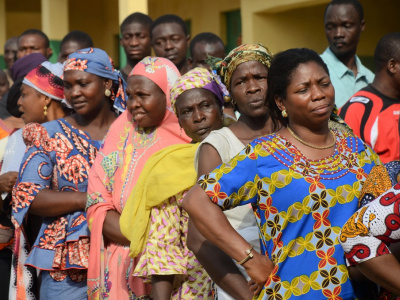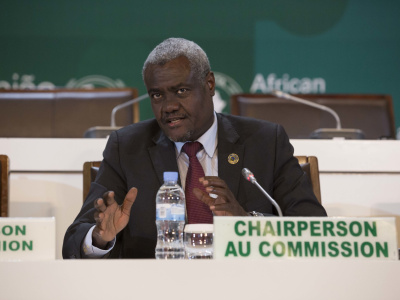
Do we expect too much from election observation missions?
As the electoral crisis that started in Kenya last summer drags on and takes new dimensions, onlookers cannot help but wonder if the international community could have done better for the country. After all, several observation missions were present in the country at the time of the elections in August 2017 including the European Union, the African Union, the Commonwealth and the Carter Centre. Could these election observation missions (EOMs) have done more to prevent the crisis that unfolded after the first results were announced? Or were the expectations unrealistic? What should then be expected from observers in the upcoming elections in Sierra Leone on 7 March and in subsequent elections in Africa?
International electoral observation – at the polling station and throughout electoral processes – has become a norm around the world. Organisations such as the African Union and the European Union made it a privileged way to engage with and reinforce electoral processes in Africa. By taking stock of the challenges encountered by election observation as of 2018, from risks of external manipulation to internal dilemmas, through the adaptation to increasingly digitised procedures, we can provide some pointers on what can be reasonably expected from EOMs.
Why election observation missions?
The general logic of election observation missions is to deter fraud by their mere presence. And also to detect fraud and call it by its name if it does take place. After the elections, observers make recommendations to improve the quality of the next elections.
Such missions only take place when an election is credible. Due to the lack of credibility in the case of the Gambia elections last year, ECOWAS cancelled its mission and, the same year, the EU cancelled its mission to Angola. In 2015, the AU already annulled an EOM in Burundi. Both EU and AU refused to send one to Egypt for what promises to be an uncompetitive presidential election next month.
International electoral observation is frequently criticised. A recent example was the Kenyan electoral process last year, when a first election in August was nullified by the country’s supreme court. The Court’s decision came after the EOM by the European Union and others had released preliminary statements which, while raising a number of concerns, drew no conclusions regarding the overall validity of the election, hence allowing the winning party to frame EOMs as stamps of democratic legitimacy. Similarly, the African Union’s EOM, led by former South African President Thabo Mbeki, noted a number of concerns in its preliminary report but also that it might be premature to make any final statement. No final report was published. The final report of the EU EOM, including the election redo which took place last October, was released in January, but it was dismissed by both the incumbent Uhuru Kenyatta as well as the opposition leader Raila Odinga. The latter recently escalated the electoral crisis by announcing his accession as “the people’s president”.
One cannot help but wonder whether election observers are doomed to be forever either ignored or misquoted and utilised in service of individual agendas. What can they realistically hope to achieve and up to what point can they account for and ameliorate a political process?
Here we identify four reasons why it is still wise to deploy election observation mission provided they are accompanied by tempered expectations and carefully implemented.
Electoral observation is not about stamping a process as ‘free and fair’
Election observation assesses a process – not just on election day but at times up to three months ahead – and checks its conformity to commitments taken by the country in question, not to ‘international standards’.
Ideally, their reports and conclusions should be seen for what they are: carefully-worded statements with nuances that reflect the limitations of the EOM in judging a complex process. Yet domestic media and political actors frequently turn reports into overall endorsement or condemnation.
In fact, hardly any election anywhere is perfect on all counts. Election fraud is a persisting problem and very difficult to eradicate since the scope for fiddling is immense and can adapt to the presence of observers themselves. As a result, EOMs scrutinise numerous aspects of an election’s context: legal framework, independence of the judiciary, campaign financing, media freedom and practices, instrumental violence, polling and tallying processes, result aggregation, promulgation…
ICT and changes in electoral procedures increase opportunities for unnoticed manipulation. Digitalised procedures are now widespread, with electronic transmission and collation of results, which observers often cannot scrutinise. This was the key concern with Kenya’s annulled August 2017 elections. In some developing countries, technical challenges arise even long before the electoral process, at the stage of voter registration.
Temper expectations of impact
Some missions may have the mandate to “intervene if relevant laws or standard procedures are being violated or ignored”, such as the African Union’s EOMs. Realistically, however, observers have no means of enforcement even when they notice breaches. Their sole weapons are the communiqués and reports they release.
In many African countries – as elsewhere in the world – it is frequent practice for contenders in an election to deny their opponents any legitimacy. By contrast, EOM reports can be too nuanced to convey audible messages unless they are translated into an endorsement or a condemnation.
Recommendations offer a good basis for international engagement in the longer term, but the response can be ‘token reforms’ not followed by meaningful change. Conditionalities such as tying the delivery of official development assistance to the quality of an election are increasingly inefficient and illegitimate.
International organisations providing election observation missions have to balance the prospects of making a useful contribution – instead of being ignored or misused – with the financial costs. They also need to weigh in the risks incurred, in terms of reputation but also the risk of making a crisis worse.
The need to respect a country’s self-determination
When they are in fact ‘audible’ despite their nuance, EOM reports distort domestic processes. Indeed, findings inevitably influence the legitimacy of certain actors (incumbents, challengers, judiciary, media, etc.) and, hence, change the possible power configuration resulting from the electoral process. As such, it can go directly against the underlying rationale of democracy: self-determination.
This is significant for the EU, often suspected of serving the purposes of its former-colonialist member states, but also for African regional organisations, often suspected to be under the control of a few hegemons. For instance the East African Intergovernmental authority for development (IGAD) provides EOMs following ad hoc procedures each time, thus leaving the door open to criticism for double standards. Even the decision to send or not an EOM is a political one, which tends to consolidate some positions while undermining others.
This ability to distort the domestic political arena is particularly problematic if observers are not fully neutral. Observers such as the EU are known to keep watch over the findings of their missions before they are released, which opens up the possibility to amend them to serve other purposes, such as preserving peace, protecting allies or defending other interests. In such cases, EOMs can be the vehicle of deliberate international interference and undermine a country’s self-determination.
Taking into account the country’s deeper dynamics
Observers have to decide what to do with the (limited) discretion they hold over the content and phrasing of their report. A fundamental dilemma is whether to call out breaches openly, which can stimulate unrest and lead to violence, or to ‘salute steps in the right direction’. which stabilises an electoral process but can be interpreted as calling a region or country not ready for full-fledged democracy. If observers do adopt such strategic thinking, they need to see the bigger picture that also takes into account many aspects of the post-election period. This can be difficult.
National political contexts are often more complex than can be envisioned in EOM guidelines. While the scope and professionalism of the election observers allow embracing many of the local dynamics, they tend to align with a theory of what an election is about which does not always match with practice.
For instance, many rural communities vote unanimously after taking a decision – often inclusively – in traditional fora that are easily overlooked. Overwhelming election results, sometimes qualified as totalitarian can, in fact, reflect a different form of participation, or a culture of the ‘big man’ rewarding displays of strength. Sometimes they simply reflect conservative electoral behaviours concerned mainly with survival and determined to elect the winner.
Another prevalent case in point is ethnic politics. In several African countries – such as Kenya – parties contend in elections not on the basis of a political programme but on the basis of getting a specific ethnic coalition in power to secure an access to resources. One of many complex consequences of such cases: equitable media treatment and freedom of speech can be entirely out of reach in ‘stronghold’ areas controlled by specific ethnicities, for rival ones.
If these four issues are given the attention they deserve, international election observation should remain an important means of engagement with nascent African democracies, not just for Western actors but also for the African Union and some of the continent’s regional organisations. But the shortcomings of EOMs open the door for a discussion on what else could be done to contribute to country-owned, peaceful and successful electoral processes.
The views are those of the authors and not necessarily those of ECDPM.




